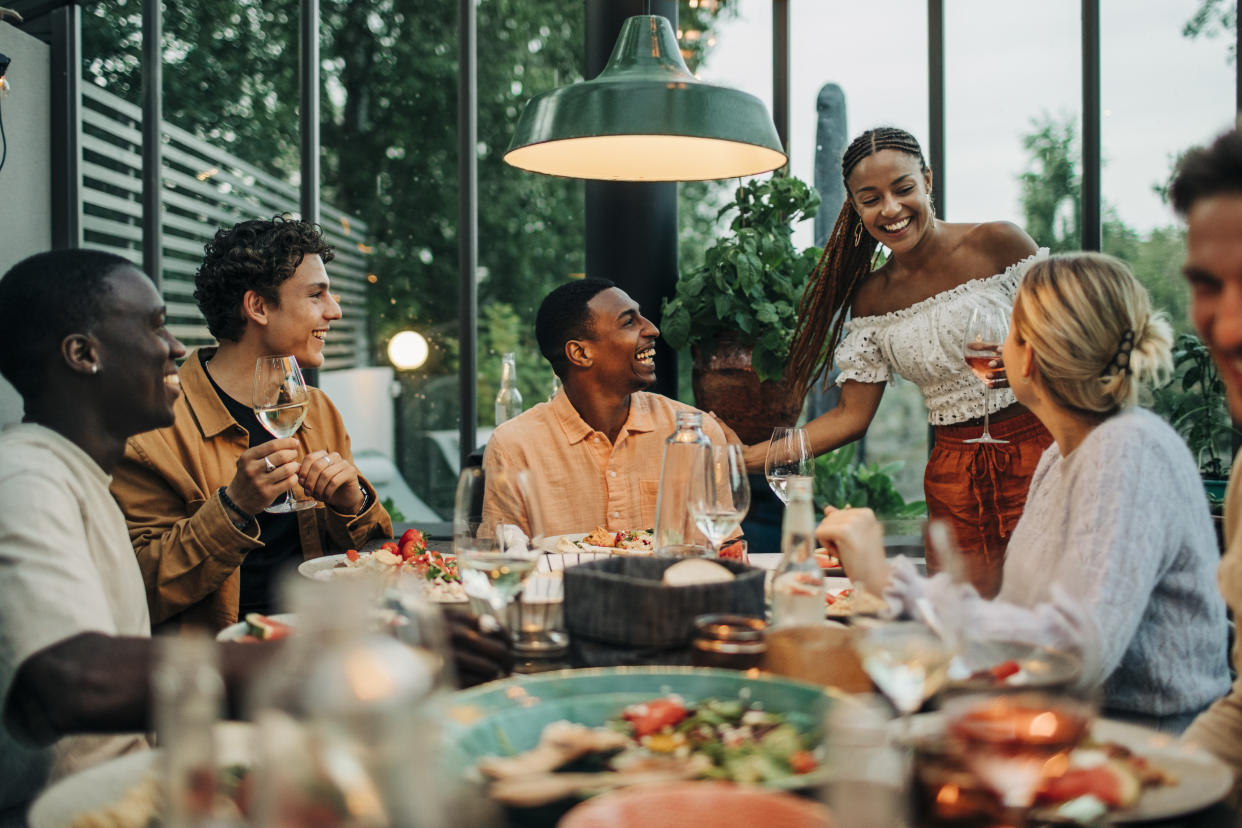Making new friends can be tough. 4 expert tips for creating connections.

According to a survey released by the American Friendship project last month, the average American has four or five friends — and fewer than 3% report having no friends. Are you looking to expand your crew, or yearning to make some new connections and feel less socially isolated? While making new friends as an adult can be tricky — especially if you're living in a new area, work from home and have few opportunities for in-person meet-ups or feel awkward about turning a casual acquaintance into a genuine friendship — experts say it's worth putting yourself out there.
“One benefit of cultivating new friendships ... at an older age is that you are more likely know yourself better,” Christina Hong Huber, a clinical psychologist and professor of psychology at the Meltzer Center, tells Yahoo Life. "You know what kind of friend or friendship you are seeking, and what type of friendship you can offer to others.”
Ready to get started? Here's what she and other experts recommend to build some fresh bonds.
Kill 'em with kindness
Many of us interact with at least a few people every day — a neighbor, a co-worker, another parent at school drop-off — or have surface-level acquaintances we’d like to get to know a little better. So how do we turn them into more than people we just say hi to?
If a new neighbor moves in and they seem like someone you’d like to get to know, Hong Huber recommends dropping by with something small, or even just making a simple introduction. “A warm welcome can go a long way,” she says. “Or if you move into a new neighborhood, you can provide compliments on a neighbor’s yard and ask for some tips.”
Amber Robinson, a therapist and owner of A Road Through Therapy Group in Los Angeles, agrees that curiosity is a great conversation starter.
“Offering genuine compliments is helpful because it starts you off on an immediate positive note,” says Robinson. “When you compliment someone, you show them that you notice and appreciate something about them, which naturally makes them feel good.”
Keep the momentum going
Rachel Steinman and Rachel Winter, co-authors of Stay Golden, Girls: Friendship Is the New Marriage, recommend taking a proactive approach to making and maintaining friendships.
“Don’t wait for a potential new friend to reach out," the duo known as "the Rachels" tell Yahoo Life. "Think of a new friendship as an exciting opportunity." If you hit it off with someone and it seems like you're on the same page about wanting to get to know each other, take action.
While it's easy to swap contact details or make a vague plan like "we should hang out sometime," such good intentions can easily be easily put off and forgotten. For this reason, Steinman and Winter suggest getting a "friend date" in the books sooner rather than later. “Before you leave each other, schedule something in your calendars," they say. "Even if your schedules don’t permit frequent get-togethers, keep checking in to maintain a connection." This helps avoid a lengthy pause in actively connecting.
Lead with vulnerability
While opening up may not come naturally for all of us, it does signal to others that we're looking for a deeper connection. “Embracing vulnerability is key to forming genuine connections and real friendships,” says Robinson. One way to do this is to be less guarded — and to show interest in what your new friends have to say.
“Having an engaging conversation shows you’re interested in getting to know them on more than just a surface level,” Robinson adds. “Ask questions and listen actively to their responses.”
“Find an area of similarity to build a deeper connection,” suggests Hong Huber. “For instance, if a new friend also is a parent and has alluded to their postpartum struggles or challenges with their in-laws and you can relate, that might be a way to deepen your relationship if you seek an emotionally intimate relationship.”
Finally, don't be afraid to ask for help. If you truly need something — a shoulder to cry on, an emergency dog sitter, whatever — just ask instead of worrying about coming across as needy.
“When we reach out for help, we show our vulnerability and need for others," say Steinman and Winter. “Asking for help is not a sign of weakness; it shows trust and faith in new friends.”
But also practice patience
All that said, Steinman and Winter also say that everyone needs to put in the time and be patient. "Old friends have spent countless hours together developing an understanding of what makes each other tick. All those inside jokes don’t magically appear,” they say. “Deep friendship bonds don’t form overnight, but rather, expand and deepen over time.”
Cherie Concepcion, a marriage and family therapist, also points out that everyone’s tolerance for social engagement is different. It's important to feel it out, and remember that things like stress and trauma can determine whether someone has a higher or lower tolerance for constant socialization. If someone hesitates at making plans immediately or takes a bit longer to respond (but eventually does), give them a little space and grace, then try again later. Respecting boundaries is key, as is remembering that not every friendly face will bloom into an actual friend. But some might, and those are worth putting in the work.
“Friendships are just like any other relationship," says Robinson. "They require and deserve our time and effort. Dedicate some specific time to your friendships. If you don’t have time, make time.”


